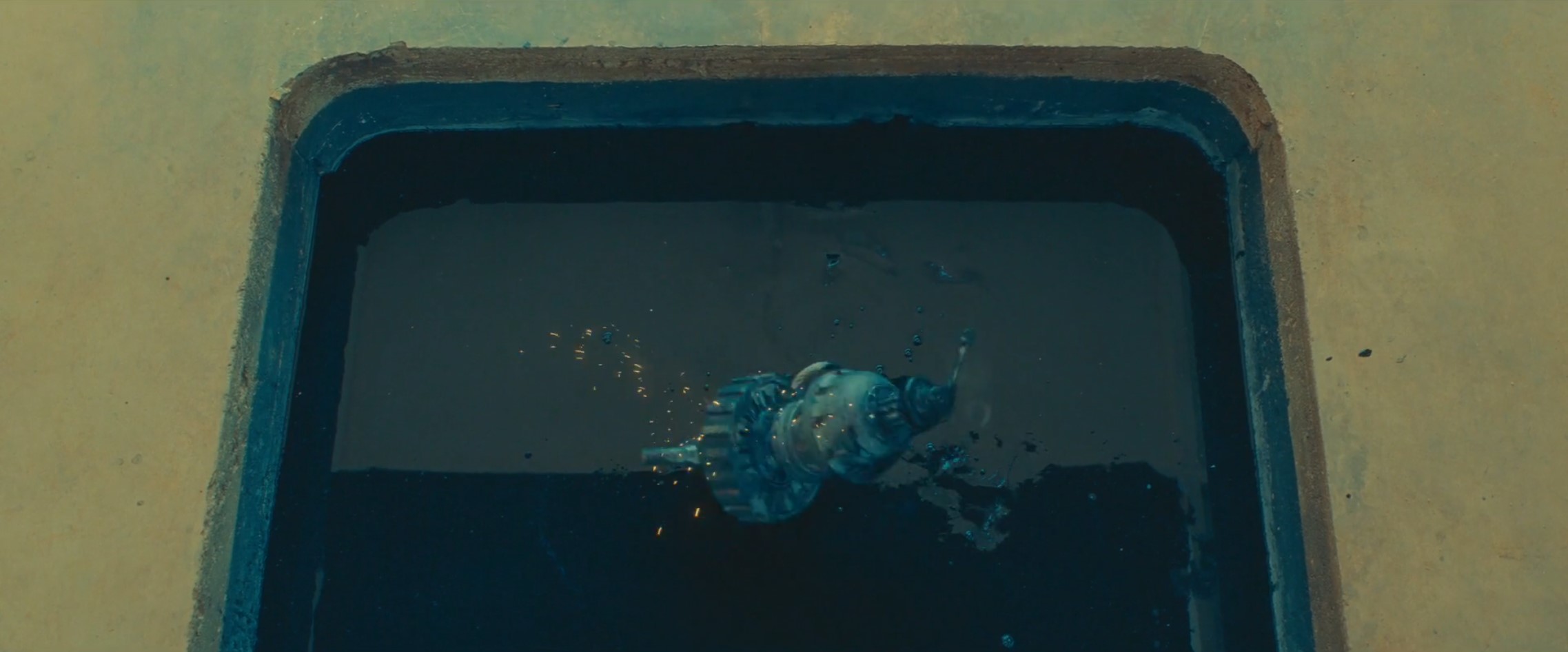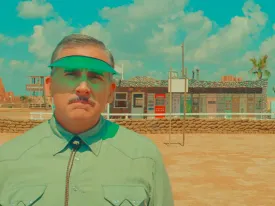Asteroid City: Breakdowns vs. Lockdowns

I'm always late to Wes Anderson movies because in between their releases I completely forget how entertaining he is, which leaves me with my overall impression of his work: deep melancholy. So I only seek him out when I'm in the mood for that — and am inevitably amazed by how much fun he's having.
In Asteroid City, that takes the form of two gags:
*I've had a number of theories on this, my latest: here's a guy with a love of miniatures, and if you're playing with a dollhouse, you'll spend a lot of time peering in through the windows, which of course provide you with a lot of axial views of the interior.
1. There's a roadrunner that greets us at the door of the film, inviting us to consider the origins of Anderson's signature orthogonal camera moves.*
2. Moments later Jason Schwartzman's character, Augie, gets his cigarette lighter topped up by a gas station attendant with a pump.
But the melancholy is not too far behind, and it's tied to something I read differently than 🐖, who brings up the COVID parallels:
Several commentators have noted that this is also Anderson’s COVID film; after the alien arrives, filches the town’s namesake asteroid, and departs, the town is put under quarantine, and the boredom and anger that the town’s visitors feel at being forced to stick around this crummy little town for so long, the stasis and madness of it all, surely ring true to a lot of viewers around the world. Being stuck in an unending dream of 1955: hey, that’s not too bad as a summary of recent American judicial politics.
What makes the movie so satisfying is the level of emotional depth he can bring to every scene — the movie feels like another strong step forward in that sense... assuming my Anderson-amnesia hasn't led me astray.
COVID actually didn't occur to me at all, which is funny. I might have missed that because I stuffed those years down the memoryhole like a lot of people, but also because the premise of Asteroid City feels like something Anderson could have tackled at any point in his career.
For example: after Augie lights his pipe, they speak to a mechanic, played by Matt Dillon, who's going to tell them what's wrong with their broken down car, which doesn't have "problems" or "issues", but "symptoms".
Now let's pretend that car is Wes Anderson's brain. Its very particular mechanisms secured funding for him and a whole crew to set up a pastel-toned Burning Man there in the Spanish desert, at which point it has a nervous breakdown, due to its very particular mechanisms. And now that the whole team is stuck there, the pressure is on. Can all of them — but particularly Anderson — produce something magical?
This anxiety around the creative process reminds me of The Life Aquatic with Steve Zissou: Steve brings a whole family of people to the bottom of the ocean in a seemingly quixotic quest for the jaguar shark... but here comes the shark.
One scene, where the whiz kids play a memory game involving the names of famous scientists, ran for such a long time. But towards the end of the movie there's a Meissner-esque figure who leads a workshop of actors in repetition/chanting, and I think the scene works for me in that light. The point of repetition in Meissner is to stick on a line of dialogue until an authentic impulse reaches up to make you say something different — don't talk just to talk.
Attunement via repetition, or attunement in spite of a failure to articulate (Don't understand the words you're speaking? Adrien Brody's character: "Doesn’t matter. Just keep telling the story. You’re doing great."), these are interesting lines for Anderson to go down. He's so naturally circumspect, so whenever he cuts loose it's intriguing.
Of course there's another example of this in Asteroid City: while Augie's car is responsible for his family's presence, it's the ingenuity of a bunch of odd/gifted children who have drawn together the rest of the cast. This time, the magical encounter is with the alien: a nervous, twitchy dude.
The dynamic of this feels ever-so-slightly different than a quarantine story. This may be pure semantics, but I think it's the difference between a lockdown and a breakdown. In lockdown, the authorities are suppressing a natural system of interactions. In an Anderson movie, there's been some prior breakdown which knocked out that system of interactions, and now it's a challenge of reestablishing all that. The parts may be flawed, the alien may be nervous, but we're going to give it a shot, and make it the best show we can. That's what I liked so much about Asteroid City, and I think I'm 100% with 🐖 on this.
